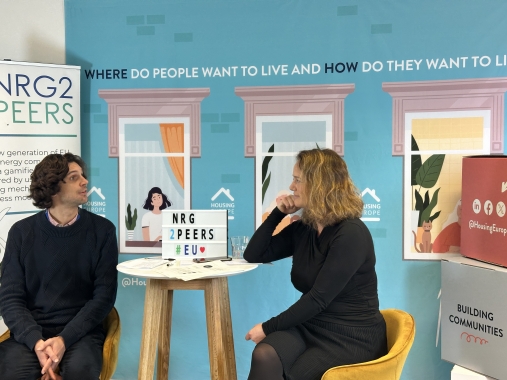Renewable energy sharing in the public, cooperative, and social housing sector in Europe
And how to support the just transition
23 November 2023 | Published in Energy
The new 'Innovation bites' webinar series started on the 23rd of November and its first episode focused on how energy communities can be integrated in social housing.
Tim Wolters opened with an overview of the soon-to-be-ended NRG2Peers project in which Housing Europe was involved, that had as main goal to support the uptake of peer-to-peer energy. Carine Puyol from L'Union sociale pour l'habitat painted the big picture of the French social housing sector and its objectives: to decrease and stabilise electricity prices for tenants; to reduce the carbon footprint energy consumption of buildings; and to contribute to local energy production. The use of energy communities is one of the best solutions available.
The Swedish cooperative approach was also presented by Mikael Rosén from HSB. The association has 30 of the 100 largest rooftop plants in the country and also the largest solar plant in Sweden, and yet none of them are used for energy sharing within a Renewable Energy Community (REC). Different projects take place around the country to develop solutions, such as 'Hammarby sjöstad' - composed of testbeds on micro grids and flexibility markets.
From European Commission Achille Hannoset said that the emergence of energy communities is not as fast as hoped for. They are a social organisation with social motives, a way to help energy vulnerable citizens. He highlighted that while currently there is still a climate with high market energy prices, which contributes to building a business case, in the near future it might stabilise, meaning consumer protection schemes are needed. As to what should be done to properly support organisations that can be key multipliers, he believes that ‘Legislation is obviously the first solution.’
Heleen Schockaert from REScoop admitted that there is still a lot of scepticism on energy communities, they seem to be a tool for those who have the means. She highlighted that they are the only social innovative tool for addressing energy poverty in Europe so far, even though there is still a lot of uncertainty. Energy transition is not something purely technical, it will require a societal shift.
Our Policy Director Julien Dijol concluded that going beyond the single building solutions would be our best option. Housing Europe members have been pushing for this to be recognised in the EU legislation. 'It's time to go from theory to practice'.
Missed the event?